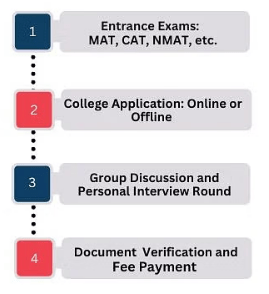
- Introduction
- Relevance of Healthcare Management
- Core Curriculum
- Admission Process
- Top Institutes
- Career Paths
- Public vs Private Sector
- Salary Range
Introduction
Healthcare management involves the administration, leadership, and organization of healthcare systems, hospitals, clinics, and public health institutions. This multidisciplinary field requires professionals to combine expertise in healthcare services with strong management skills. As the healthcare industry expands rapidly due to technological advances, aging populations, and increasing demand for quality care, effective management has become more crucial than ever. Healthcare managers and administrators play a vital role in ensuring that medical facilities operate smoothly, providing high-quality patient care while controlling costs and enhancing patient satisfaction. They also navigate complex regulatory environments, ensuring compliance with healthcare laws and standards. The role of healthcare management has significantly evolved alongside the growing expectations for healthcare services. Modern healthcare managers must possess leadership qualities, strategic thinking, and a thorough understanding of healthcare policies and regulations. They are often tasked with integrating new technologies such as electronic health records, telemedicine, and data analytics to improve care delivery and operational efficiency. Additionally, healthcare managers are responsible for workforce planning, budgeting, and resource allocation, all aimed at maintaining a balance between cost-effectiveness and excellent patient outcomes. The importance of healthcare management extends beyond individual hospitals or clinics; it influences the performance of entire public health systems. Efficient management improves access to care, enhances service quality, and supports public health initiatives that benefit communities on a larger scale. Ultimately, effective healthcare management is essential to meeting the challenges of today’s complex healthcare environment, ensuring sustainable, high-quality care for patients worldwide.
To Explore PMP in Depth, Check Out Our Comprehensive PMP Certification Training To Gain Insights From Our Experts!
Relevance of Healthcare Management
The relevance of healthcare management has increased significantly due to several key factors shaping the industry today. One major driver is the aging global population, which has led to a higher demand for healthcare services, especially in areas like geriatrics and chronic disease management. As more people require long-term care and specialized treatment, healthcare managers must ensure that facilities are equipped to handle this growing patient base efficiently. Technological advancements also play a crucial role in healthcare management’s rising importance. The widespread adoption of electronic health records (EHR), telemedicine, and other health information technologies has transformed how care is delivered. Healthcare managers are responsible for overseeing the integration and effective use of these tools, ensuring that staff are trained and that technology enhances patient care without causing disruptions or inefficiencies. Controlling costs and improving efficiency are constant challenges in the healthcare sector. With healthcare expenses rising globally, managers must optimize resource allocation, reduce waste, and implement cost-saving measures while maintaining or improving the quality of care. Effective management helps balance financial sustainability with patient-centered outcomes. Additionally, healthcare policies and regulations are continuously evolving.

Healthcare managers must stay informed about changes in laws, accreditation standards, and quality requirements to ensure compliance. This vigilance helps healthcare organizations avoid legal issues and maintain trust with patients and regulators. In summary, healthcare management is vital to the smooth operation of healthcare systems. Without skilled management, healthcare delivery could suffer from inefficiencies, higher costs, and compromised patient care. Effective healthcare management ultimately supports better outcomes for patients, providers, and the broader community.
Core Curriculum
- Healthcare Finance and Accounting: Understanding financial management in healthcare organizations, budgeting, and cost control strategies.
- Healthcare Laws and Ethics: Learning about the laws and regulations governing healthcare systems, patient rights, and healthcare ethics.
- Healthcare Marketing: Focusing on how healthcare organizations build brands, communicate with patients, and manage public relations.
- Organizational Behavior and Leadership: Developing leadership skills necessary to manage teams and operations within healthcare facilities.
- Healthcare Information Systems: Training in technology, including health information management, EHR systems, and telemedicine.
- Strategic Management in Healthcare: Learning how to develop and implement long-term strategies for healthcare institutions.
- Public Health and Policy: Understanding the role of public health policies and their influence on healthcare management.
- Bachelor’s Degree Requirement: Most programs require applicants to hold a bachelor’s degree, preferably in a healthcare-related field, life sciences, or business administration. However, candidates from other academic backgrounds may also be considered if they meet specific prerequisites.
- Standardized Entrance Exams: Some institutions mandate entrance exams such as the GRE (Graduate Record Examination) or GMAT (Graduate Management Admission Test), especially for competitive MBA programs with a healthcare specialization.
- Application Documents: Candidates must typically submit academic transcripts, a current resume or CV, letters of recommendation, and a statement of purpose outlining their career goals and motivation for pursuing healthcare management.
- Personal Interview: Many programs include an interview round either in person or virtual to evaluate the applicant’s communication skills, leadership potential, and awareness of healthcare challenges.
- Language Proficiency Tests: International applicants are often required to demonstrate English proficiency through exams such as TOEFL or IELTS, ensuring they can succeed in an English-language academic environment.
- Work Experience (Preferred): While not always mandatory, relevant work experience in healthcare, administration, or management is highly valued and may strengthen an applicant’s profile, especially for executive or MBA-level programs.
- Minimum GPA Requirements: Some institutions specify a minimum undergraduate GPA (often around 3.0 on a 4.0 scale) as part of their eligibility criteria to ensure academic readiness for graduate-level coursework.
- Hospital Administrator: Responsible for managing the daily operations of a hospital, including budgeting, staffing, regulatory compliance, and coordination among departments to ensure quality patient care.
- Healthcare Consultant: Advises healthcare organizations on strategies to improve operational efficiency, reduce costs, optimize workflows, and implement industry best practices.
- Medical Practice Manager: Handles the administrative functions of private clinics or group practices, including patient scheduling, staff supervision, financial management, and regulatory compliance.
- Health Information Manager: Manages the secure handling and storage of patient records and health data, ensuring compliance with data protection regulations like HIPAA.
- Public Health Manager: Directs public health programs and services, often working with government agencies or NGOs to address health disparities and implement community health initiatives.
- Clinical Research Manager: Oversees clinical trials and research projects, ensuring protocols are followed, data is accurately recorded, and ethical standards are maintained.
- Health Insurance Manager: Manages operations within health insurance companies, including claims processing, policy development, customer service, and compliance with healthcare laws.
Are You Preparing for PMP Jobs? Check Out ACTE’s Project Management Interview Questions & Answer to Boost Your Preparation!
Admission Process

Top Institutes
Several reputed institutes around the world offer specialized programs in healthcare management, providing students with world-class education and strong professional networks. Harvard University in the USA is renowned for its Master of Healthcare Administration (MHA) program, which features a rigorous curriculum focused on leadership, innovation, and healthcare policy. Harvard’s emphasis on real-world applications and cutting-edge research makes it a top choice for aspiring healthcare managers. Johns Hopkins University, also in the USA, offers a Master of Health Administration (MHA) through its Bloomberg School of Public Health. This program is well-regarded for its strong research foundation and focus on public health initiatives, preparing students to address complex healthcare challenges on both local and global scales. In the UK, the London School of Economics and Political Science (LSE) provides an MSc in Health Economics and Policy. This program uniquely combines economics, policy, and management aspects of healthcare, equipping graduates with the skills needed to navigate the economic and regulatory environment of healthcare systems. In India, the Indian Institute of Management Ahmedabad (IIM-A) offers a Post Graduate Program in Management for Executives (PGPX) with a healthcare management specialization. This program blends management principles with healthcare-specific knowledge, preparing leaders for the fast-evolving healthcare industry in India and beyond. The National University of Singapore (NUS) provides a respected Master of Public Health (MPH) program that includes a focus on healthcare systems management, ideal for professionals seeking expertise in managing healthcare delivery in diverse contexts. These institutions stand out for their academic excellence, industry connections, and ability to prepare students to become effective healthcare management professionals globally.
Career Paths
Are You Considering Pursuing a Master’s Degree in PMP? Enroll in the PMP Masters Program Training Course Today!
Public vs Private Sector
Healthcare management professionals have the option to work in either the public or private sector, each presenting distinct advantages and challenges. In the public sector, professionals typically work in government-run hospitals, public health organizations, or regulatory bodies. These roles often involve managing large-scale operations with budget limitations and navigating complex policy frameworks. While resource constraints can be a challenge, public sector jobs usually provide greater job security, stable benefits, and the chance to influence healthcare delivery on a broad societal level. Public sector work often focuses on improving community health outcomes and ensuring equitable access to services. On the other hand, the private sector includes private hospitals, specialty clinics, healthcare startups, and pharmaceutical companies. Jobs in this sector tend to offer higher salaries and often provide a dynamic, fast-paced work environment that encourages innovation. The private sector may offer more opportunities for rapid career growth and the flexibility to implement new technologies and management practices. However, it can also be more competitive and sometimes less stable, with job security tied closely to market conditions and organizational performance. Choosing between the public and private sectors depends on individual career goals, values, and preferences. Some healthcare management professionals are drawn to the public sector’s mission-driven work and stability, while others prefer the private sector’s innovation and financial rewards. Both sectors play essential roles in healthcare, and professionals can find meaningful and rewarding careers in either path depending on their skills and aspirations.
Are You Interested in Learning More About PMP? Sign Up For Our PMP Certification Training Today!
Salary Range
Salaries in healthcare management can vary widely based on factors such as job role, geographic location, and years of experience. For entry-level professionals with zero to three years of experience, the typical annual salary ranges from $50,000 to $70,000. These roles usually include positions like healthcare coordinators, junior administrators, or assistants in hospitals and clinics. Entry-level salaries reflect the foundational knowledge and skills gained during education and early work experience. As professionals gain more experience, moving into mid-level roles with three to seven years of experience, salaries tend to increase significantly. Mid-level healthcare managers often earn between $70,000 and $100,000 annually. At this stage, individuals may take on greater responsibilities such as managing departments, overseeing projects, or leading small teams. This experience allows them to contribute more strategically to healthcare operations, which is reflected in their compensation. Senior-level healthcare management positions, typically held by professionals with over ten years of experience, command salaries ranging from $100,000 to $200,000 or more annually. These roles include senior administrators, directors, and executives who are responsible for major decision-making, policy implementation, and overall organizational management. High-level positions like Hospital Administrators or Health System Executives often earn salaries exceeding $200,000 due to their extensive expertise and the critical nature of their responsibilities. Geographic location also plays a significant role in salary variations. Healthcare managers working in urban areas or developed countries generally receive higher pay compared to those in rural or developing regions, reflecting differences in cost of living, healthcare infrastructure, and demand for skilled professionals. Overall, healthcare management offers a rewarding career path with strong earning potential that grows with experience and responsibility.





